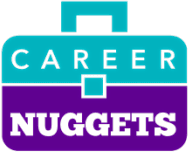
Morenike
Ajayi
Finance Director, Founder
Career Nuggets
Morenike speaks about how she is working to help and support Black Minority Ethnic (BME) individuals advance in their chosen careers
Can you tell us a bit more about Career Nuggets and what inspired you to set it up?
At the time I was working for an organisation and was trying to move into a senior management position. From my experiences there and what I had noticed with my colleagues around me, the landscape in senior management wasn’t representative of the true diversity in the organisation. In fact, junior levels were far more diverse than senior management and I wanted to break in.
It was at this point that I found a mentor within the finance industry (which was not an easy task) and I realised from working with them that I was missing the ‘soft skills’ in my skillset. This covered areas such as how you communicate, how you integrate in an organisation and how you are visible and add value not just doing the job but within the organisation as a whole. Individuals in the BME community often focus on achieving qualifications and completing training, but my mentor helped me to identify that these ‘soft skills’ are crucial, and often not taught.
A short while later, my role was made redundant. I got my redundancy package, and asked myself, what tangible things can I do with that money to make an impact? So, I decided to launch Career Nuggets with it.
The message that I wanted to bring to the table was to highlight the importance of soft skills. We need to recognise this to help BME individuals break into those top management positions and not shy away. I wanted to have role models, mentors or visible leaders that could understand my culture and background, where I’m coming from and there wasn’t anybody that could really identify with those battles.
Career Nuggets run events, an academy and we have a TV show and public speaking opportunities. We empower people in the BME community and have had great successes. Over 2000 people have gone through one of our programmes. Whether they need a soundboard; or a community that can inspire them; or tips to know how to progress, they have been able to find it in the community. Ultimately though, I realised that if i want to see change, then I need to be the change.
How has the industry changed since you first started out? And are these changes for the better?
The finance industry has changed, and it’s definitely for the better! What I noticed when I stepped away from working directly in finance (and began showcasing lots of professionals through my platform), was that there is now more openness and community. BME individuals in particular are no longer scared to be authentic and say, ‘this is me’.
I believe that opportunities to enhance career pathways within finance have always been there. It was actually more that people were not getting involved in the initiatives available to them – and I think they are doing this more now. Professionals are grabbing hold of more chances and taking advantage of those opportunities; they are stepping out of their comfort zone a lot more.
Primarily I think that is as a result of the fact that there is more support out there and more information available. Google is your best friend and today we are overwhelmed with information and it’s giving more people the confidence to take those steps. You need to be honest with yourself and say, ‘maybe I have this gap’, and I need to address my development, and use these platforms to help. The finance industry is a much better environment now.
So, I think things have moved on and we’ve seen positive change.
Ultimately though, I realised that if I want to see change, then I need to be the change.
What changes / improvements do you feel finance departments need to implement to drive further change and promote greater inclusivity?
If we’re serious about driving change, I want organisations to recognise that they need to introduce and encourage soft skills as well as sharing more stories and the lived experiences of their teams.
I think the first thing for finance departments to do is to respect each employees’ values and beliefs. Businesses will have their core values, but the next step is creating a safe space where people can be themselves and share their values with the business too. Instead of boxing people in and telling them how they should be, welcome their contributions. The finance industry as a whole are doing much better with this, but there’s always more to be done.
The beauty of bolstering diversity and inclusion in our teams is that everybody has a diverse perspective, a different way of solving things and a different way of taking action. The more voices you hear, the richer it makes your decision, because you have considered it from different angles. Finance departments need to be open with their employees and outline what the extra value add is that they can provide. Employees need to be able to see how they can contribute to the progress of the organisation. Ensure there is a golden thread from your employee’s objectives to the overarching objectives of the business so that people feel valued.
Creating personal career plans for your team is also really important to ensure you can retain top talent as well as making your organisation an attractive prospect to begin with. In particular, a core change that finance departments need to make is monitoring where your jobs are being advertised, as they need to be made accessible to all. Sometimes jobs are being limited to certain platforms and boards, so it’s only reaching a particular group of people that know where they are being posted each time. I tell my mentees now, if you are fishing in one particular pond, and you are not getting any results, then you need to change the pond. If you can’t change the pond, make the net bigger.
What advice would you give BME individuals who are starting out in finance now?
First of all, invest time in finding a mentor. A mentor is really important, as a person who already has the experience of their journey under their belt, so you don’t make the same mistakes as them or fall into similar pitfalls.
In finance I expect you to be part of a professional body. Don’t just be a member. Attend the conferences, keep yourself abreast of what is happening in the industry. You have to be at the cutting edge so you can’t be ignored. Be visible – talk about it. If you don’t say anything, then no one will know what you’re doing and be strategic with your connections.
Have a career plan too – if you fail to plan, then you plan to fail. You have to have a long-term plan. Identify where you are now and be honest with yourself about how you can plug that gap. Your career development is your responsibility– so take ownership of it! Make sure you put the necessary steps in place to support yourself. Don’t wait as opportunities can come at any time.
My top tip is that I always try to add something new to my CV every six months. If I am in a role, and after six months, there is nothing new, I know that I need to make a change. This is either achieved by speaking up to a manager and asking for more responsibilities or a new challenge or take steps myself to see how I can improve on my own work.
